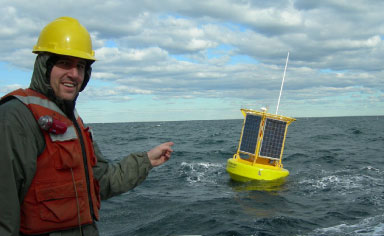|
|||
"We like to say it’s the most advanced ocean observation lab on the planet."
Dr. Scott Glenn is responsible for the design, construction, operation and utilization of the Rutgers University Coastal Ocean Observation Lab (COOL), which has sustained a continuous observational presence in New Jersey's coastal ocean since 1992 and now enables globally distributed scientists to sustain a long-term virtual presence at sea over broad regions. Originally at a remote site, the COOL operations center is now right in the middle of campus, a move made possible by the rise of the internet and remote sensing capabilities.
Scott leads teams that develop new remote and robotic technologies for autonomous surface and undersea sampling to investigate ocean processes. COOL provides a test bed that supports interdisciplinary studies and has sponsored multi-institutional experiments. The COOL center has enhanced interdisciplinary collaborations that span marine, geological, and environmental science; microbiology, computer science, engineering, education, and economics.
"Satellites were the transformational technology of the 1980s. Ocean observatories are the transformational technology of the 21st century." |
The COOL room:
- participated in the 2002-2007 Hudson Plume project (LaTTE), during which glider technology took off
- is a partner in a Homeland Security Center of Excellence
- is a key partner in the regional ocean observing association, MARCOOS
- was called on to provide tools and expertise during the Deepwater Horizon Oil Spill
| COOL Home | COOL Webcam | COOL Research | COOL Data | COOL Papers | COOL Presentations | COOL Press | COOL Gliders |
Josh Kohut, Ph.D., Assistant Professor, Rutgers University The Zen of ocean observing |



